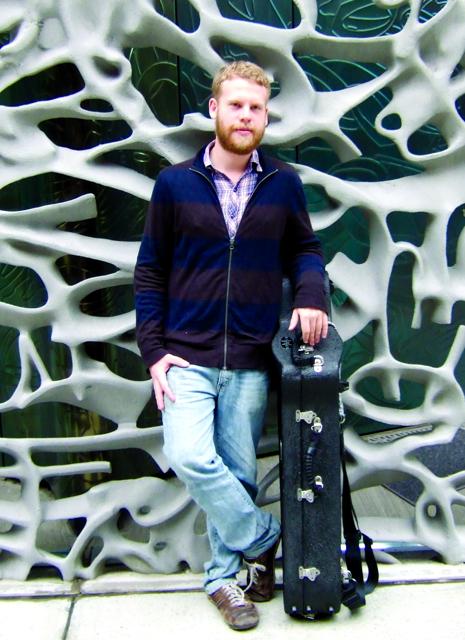Tucked into the southern shores of Lake Michigan, at the border of Michigan and Indiana, the region known as Michiana is home to state parks and wildlife preserves, universities and the College Football Hall of Fame. For the 24-year-old Chicago-born saxophonist Jonah Parzen-Johnson, Michiana is also the source of “a massive collection of hazy half-memories.” These memories, collected over years of visiting the Southern Lakeshore with friends and family, provided fruitful enough to inspire Parzen-Johnson’s debut album, Michiana.
“I like to think of myself as a pretty nostalgic person, whatever that means,” he says. “I really like to look back on things and smile. And that’s sort of where this music came from.”
In writing the songs that would form the album, Parzen-Johnson says he began with the titles. Each functions as a cue, summoning a specific memory or scene that inspired the song. The recurring title, “I Turn Left Over Train Tracks,” which appears in four iterations throughout the album (including to remixed versions at the end) comes from a regional traffic law. “In Chicago, it’s illegal to turn left over train tracks,” Parzen-Johnson says. “But the only way to get to Michiana is to turn left over train tracks.”
As much as the emotional content of the songs is fueled by nostalgia, though, the point at which Michiana arrives is anything but retro. Drawing from the rich avant-jazz tradition of his hometown, and inspired by contemporary and old-time folk musicians, Parzen-Johnson — who now resides in Brooklyn — has distilled a lengthy list of influences into a singularly elegant presentation of unaccompanied saxophone he likes to think of as experimental folk music.
Parzen-Johnson studied his instrument as a member of Chicago’s Association for the Advancement of Creative Musicians, taking instruction and advice from innovative players like Matana Roberts and Mwata Bowden. “One of the things [Bowden] really pushed me on, which I feel has been very valuable, was just trying to think of myself as a creative musician who utilized every possible element I could,” Parzen-Johnson says. “He really pushed me, like, ‘You have to get your circular breathing together, you have to understand all the different sounds you can make on your instrument and really explore all of them so you can create your own palette.’”
This teaching reveals itself in the extended techniques Parzen-Johnson employs to exploit a broad range of tones and textures. Circular breathing — breathing in through the nose while exhaling into the instrument through the mouth — allows Parzen-Johnson to play continuously through long passages. He also makes use of overtones and multi-phonic playing, as well as vocalization through the instrument. In recording Michiana, Parzen-Johnson used 15 different microphones to capture a depth and complexity of sound that is at times reminiscent of Colin Stetson’s technical workouts.
But Parzen-Johnson refuses to define his music merely by his avant-jazz technique. Folk artists like Neil Young, and those Parzen-Johnson heard singing alone on Smithsonian Folkways compilations, inspired the saxophonist to explore his own voice as a solo performer. Listening to Young’s Live at Massey Hall 1971, Parzen-Johnson was enthralled by what he perceived to be a unique intimacy between the performer and the audience. Hearing field-recorded singers performing without accompaniment on those Folkways compilations pushed Parzen-Johnson further.
“I remember listening to it and it changed my perception,” he says. “If playing solo becomes about just performing with what you have and trying to create the image of what you don’t have, then you have a lot of freedom to really delve into the melody. I feel like a lot of people when they play solo, they sort of become jugglers carrying all these different ideas around. I was trying to figure out a way to give myself the courage to try to just do one thing.”
That one thing, if it’s fair to call it that, is the balance Parzen-Johnson manages between the sometimes challenging textural segments and the plainly melodic passages in his songs. In Michiana, warm, resonant melodies reminiscent of timeless gospel and folk songs stand face-to-face with more avant-garde, polyphonic sounds.
Live, the presentation is more stripped down. Fifteen microphones dwindle to one, clipped to the bell of Parzen-Johnson’s baritone saxophone and plugged into a guitar amplifier. The simple setup helps Parzen-Johnson feel as though he’s giving an intimate acoustic performance, freeing him from as much audio machinery as possible. “Whenever I’ve tried to perform with a whole bunch of different types of microphones — especially with a throat microphone — it becomes very difficult to feel like I’m not a robot,” he says.
It’s a fitting presentation for music fueled by reminiscences of real human experience. Michiana is a place where Parzen-Johnson never lived, but visited annually. It’s where he learned to swim, and then to drive. It’s not entirely insular, though. “Even though the songs are coming from specific memories,” Parzen-Johnson says, “I’m trying to distill that out and just have that feeling. The feelings are universal.”
— Bryan C. Reed is the online editor at Shuffle Magazine, and a regular contributor to publications including MAGNET and Paste.
who: Jonah Parzen-Johnson’s Michiana, Ross Edwards and The Galen Kipar Project
where: Lexington Avenue Brewery, 39 N. Lexington Ave.
when: Sunday, June 10 (8 p.m. $5. http://www.lexavebrew.com. http://jonahparzen-johnson.com)






Before you comment
The comments section is here to provide a platform for civil dialogue on the issues we face together as a local community. Xpress is committed to offering this platform for all voices, but when the tone of the discussion gets nasty or strays off topic, we believe many people choose not to participate. Xpress editors are determined to moderate comments to ensure a constructive interchange is maintained. All comments judged not to be in keeping with the spirit of civil discourse will be removed and repeat violators will be banned. See here for our terms of service. Thank you for being part of this effort to promote respectful discussion.